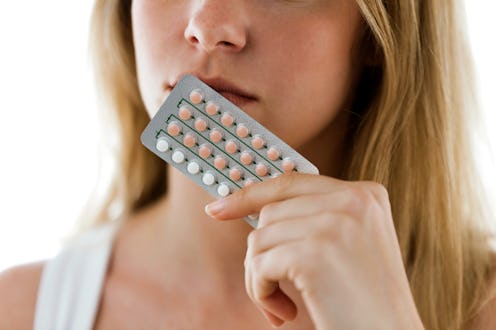Life
How Birth Control Can Help Manage This Super Severe Kind Of PMS

Premenstrual dysphoric disorder, or PMDD, isn’t as widely known as pre-menstrual syndrome or PMS, but science indicates that it’s a more severe condition. The natural hormonal cycle of menstruation and ovulation in the body can cause mood disruptions for many of us, but for people who experience PMDD, moodiness, anxiety and depression are centered on the stage of the menstrual cycle known as the luteal phase, and they can be debilitating. Hormonal birth control is often suggested to help PMDD symptoms — but how does it work?
“While the physical symptoms of both PMDD and PMS are the same — fatigue, swollen breasts, backache, headache, food cravings, bloating, constipation, diarrhea — PMDD includes emotional symptoms that are much more severe that the mood swings associated with PMS,” explains Harvard Health. Treatment of PMDD remains an area of intense research, but increasingly, scientists believe that birth control, particularly combined hormonal contraceptives, might be a good way to tackle the condition.
Scientists at Clue, the period-tracking app, tell Bustle that mood swings across the menstrual cycle are normal for many of us because of fluctuations in estrogen and progesterone. “These hormones are at high levels during the second half of the menstrual cycle, known as the luteal phase,” Clue notes.
However, for people with PMDD, the luteal phase can be particularly debilitating. “Symptoms are linked directly to the fluctuations of reproductive hormones, and a diagnosis usually requires that people experience these symptoms predominantly during the late luteal phase,” explains Clue.
The people who experience PMDD aren’t actually experiencing higher levels of hormones during their luteal phase, which is the part of the cycle just before a bleed. “Recent research indicates that women who are vulnerable to premenstrual mood changes do not have abnormal levels of hormones or some type of hormonal dysregulation, but rather a particular sensitivity to normal cyclical hormonal changes,” explains the MGH Center for Women’s Mental Health.
So can birth control help? Clue tells Bustle that it’s one of a range of choices: “Treatment options for PMDD are limited to drugs that either change hormone release, such as ovulation inhibitors, or treat symptoms, such as antidepressants.” However, birth control pills have merits that antidepressants don’t: they’re more easily available and may have fewer side effects.
Not all birth control options are good for treating PMDD, though. ‘Results from studies using oral contraceptives (OCPs) to treat PMS and PMDD have been mixed,” says the MGH Center. However, one particular kind of contraceptive seems to have positive effects: a progestin called drospirenone. A study of PMDD treatments published in the Open Access Journal Of Contraception in 2016 noted that, in several trials, combined hormonal contraceptives containing drospirenone appeared to be effective at relieving symptoms of PMDD.
Drospirenone is combined with ethyl estradiol in a variety of “combined pills” currently on the market; you might know it under the names Yasmin, Yaz or Vestura. It’s well-known enough as a treatment for PMDD that Yaz, which has 3 mg of drospirenone per pill, is approved by the Food and Drug Association as a PMDD-related medication. Why drospirenone is more effective against PMDD than other contraceptive hormones isn’t known, but drospirenone is a very specific class of drug that differs pretty radically from other contraceptives, and something about that uniqueness might make it perfect for PMDD — though scientists aren't sure why.
This might not be the only bit of birth control that can help people with PMDD. “There is evidence that other contraceptives can also have beneficial effects, especially in those with longer regimens and those containing estradiol rather than EE,” the researchers of the 2016 paper noted. But there are a lot of different factors that seem to influence PMDD, including smoking habits, so birth control’s effectiveness for treating it might be controlled by many things we don’t yet fully understand.
If you experience severe, uncontrollable mood swings just before your period begins every month, it’s important to get help; PMDD is a recognized illness and you deserve to be supported. Birth control, particularly drospirenone-based combined pills, can be part of the arsenal you and your doctor use to manage your symptoms.
This article was originally published on